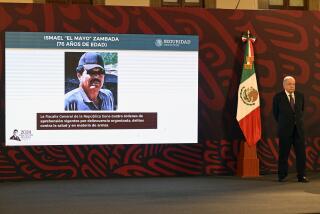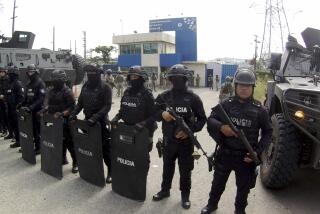15 Private Guards Hired to Protect American Embassy Arrested by Panama Police
- Share via
PANAMA CITY — In an escalation of the confrontation between the U.S. diplomatic mission here and Gen. Manuel A. Noriega, Panamanian police have arrested 15 private guards hired to protect the American Embassy and its employees.
During the week, the National Department of Investigation has rounded up the guards and two office workers, all employees of the Tesna-Mimsa security company, and has held them without charges in the Ancon Prison.
Embassy spokesman Terrence Kneebone said Friday that the arrest of the guards has not yet “compromised” the security of the embassy or its employees. “We are not going to leave unguarded any post nor leave any person insecure,” he said.
The arrests are the latest in a series of confrontations between the Noriega regime and the United States growing out of a crisis in which American federal grand juries have indicted the general on drug-trafficking and other charges, and Washington has sought his removal from power.
Most of the face-offs here in Panama have involved the military of both countries, but there have been sporadic problems for the diplomats, and several of them have been assigned bodyguards and have been trained to use weapons themselves.
Panamanian officials declined to confirm the detention of the embassy guards, but a lawyer hired by their company has been allowed to see them in prison.
Regime Has Two Aims
Kneebone said reports of the interrogation of the guards, all Panamanian citizens, indicates the government has two aims. First is to “highlight the connection” between the embassy and Guillermo (Billy) Ford, a leader of the local political opposition trying to oust Noriega. One of Ford’s bodyguards was killed last week when government security forces attacked an anti-government demonstration.
The dead bodyguard, Alexis Guerra, was a Tesna-Mimsa employee who had been Kneebone’s personal bodyguard until mid-April, when he took a leave of absence to guard Ford. Ford was one of two vice presidential candidates on the opposition ticket in fraud-tainted May 7 elections that authorities have since annulled.
Kneebone said that the Noriega government evidently wants to tie Guerra and Ford to the embassy in an move to try to prove that the local opposition is under the influence of the United States.
“It’s a way to create propaganda and a hullabaloo,” Kneebone said, “but we really don’t care. This government (Panama’s) has no credibility.”
The other reason for the arrests, according to Kneebone’s information, “is to strip away embassy security.”
The captured guards are being asked, the embassy spokesman said, “where the guard posts are, when the ones which aren’t manned 24 hours are manned, how the guards are transported, the shift changes and radio frequencies.”
“We don’t know how much they already know; we assume a lot,” Kneebone said, but this apparent attempt to find out more is worrisome. “We will study the situation and take whatever measures are necessary” to insure embassy security, he said.
Refused to Leave Panama
The spokesman, who was declared persona non grata by the Noriega regime last year but who refused to leave the country on grounds that the order was issued by an illegal government, said that remaining guards are enough at the moment for adequate protection. He added that several have been sleeping in the embassy and other U.S. offices here.
Altogether, Tesna-Mimsa provides 73 guards to protect the embassy office building, the American Consulate, the ambassador’s residence and various facilities located in office buildings throughout Panama City. In addition, certain diplomats are given personal bodyguards.
This is on top of a undisclosed number of U.S. Marines assigned to the embassy but limited to protecting the chancery, as the embassy office building is called, and the consulate.
Under a Panamanian decree issued earlier this year, the guards are supposed to be unarmed. Kneebone refused to comment when asked if the decree is being followed. He also pointed out that employees of other supposedly private security firms, some owned by Noriega or his close associates, continue carrying weapons.
Embassy Only Client
Tesna-Mimsa has a security contract for the embassy, its only client, in association with a Columbus, Ohio, firm, DOD Contracts.
Kneebone said that the National Department of Investigation, known by its Spanish initials as DENI, began arresting the guards earlier in the week after asking them to come in for questioning. (DENI is a division of the Panama Defense Forces, the nation’s sole military and police organization, commanded by Noriega.)
Others were rounded up Wednesday and Thursday, including Maria Isabel Angisola, wife of Tesna-Mimsa owner Sergio Angisola and her brother, Alfonso Marino. Both work for the company. Angisola has not been located.
Kneebone said the police first picked up Maria Isabel Angisola and then told her brother that she would be released if he brought in company documents. He did as ordered, but neither was released.
The incident comes as the embassy staff and the personnel of other U.S. government offices are being scaled down to protest Noriega’s refusal to accept the apparent defeat his regime suffered in the May 7 vote.
Ambassador Arthur Davis left Monday for “consultations” in Washington, and the rest of the staff will be reduced to 45 from the 101 who were posted here April 1. Left behind will be “essential” diplomats, communications experts, secretaries and Marine guards.
Until the current crisis developed two years ago, there were 250 American personnel working in Panama for 18 U.S. agencies.
Included among those that will have left by the end of May is the office of the Drug Enforcement Administration, one of the few U.S. agencies that continued working with Panama’s government as other contacts were severed.
Although the DEA says this cooperation had resulted in several successful anti-drug operations, embassy sources said that Washington had decided the agency’s operations are not vital.
More to Read
Sign up for Essential California
The most important California stories and recommendations in your inbox every morning.
You may occasionally receive promotional content from the Los Angeles Times.










